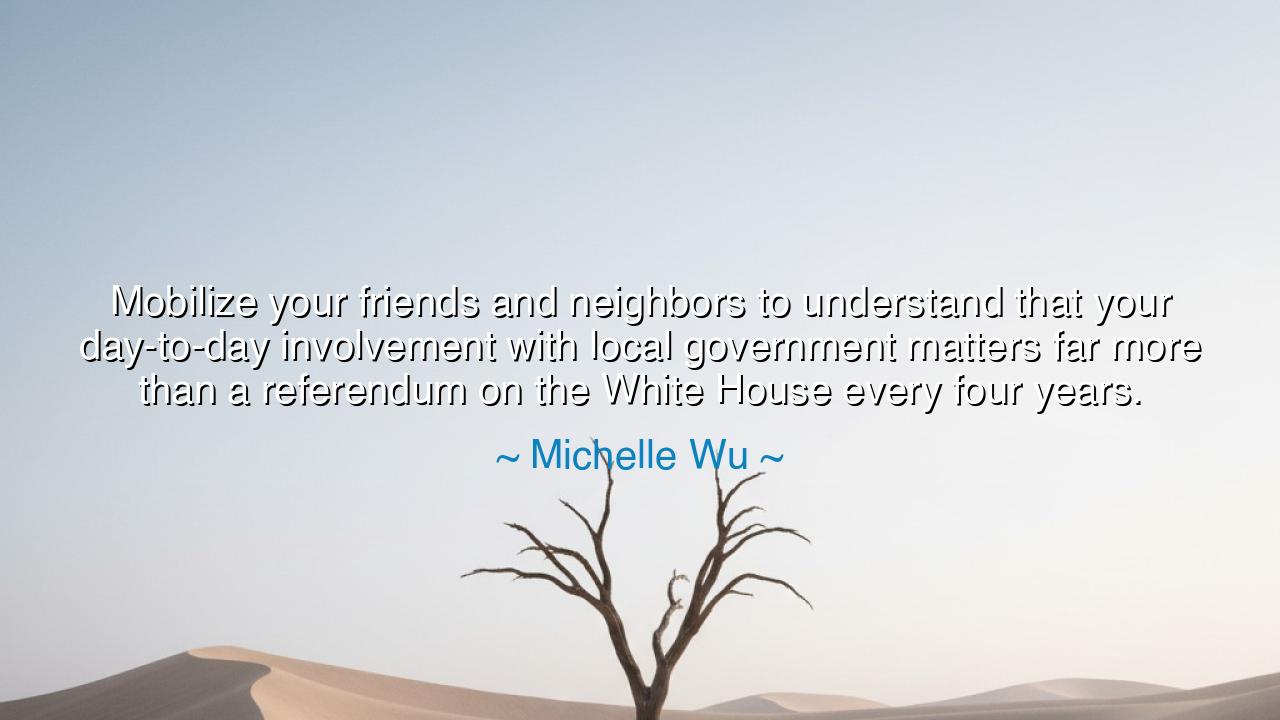
Mobilize your friends and neighbors to understand that your
Mobilize your friends and neighbors to understand that your day-to-day involvement with local government matters far more than a referendum on the White House every four years.






When Michelle Wu said, “Mobilize your friends and neighbors to understand that your day-to-day involvement with local government matters far more than a referendum on the White House every four years,” she spoke as one who had walked among the people, seen their struggles, and understood where true power lies. Her words are not just a call to civic duty — they are a summons to awakening, a reminder that democracy does not live in marble halls or televised debates, but in the humble streets, community halls, and city councils where ordinary lives are shaped. Wu, the first Asian American woman elected Mayor of Boston, knew that national politics may stir the passions of the people, but it is local action that nourishes the roots of justice and change.
The origin of this quote lies in Wu’s lifelong commitment to community engagement and grassroots leadership. Before becoming mayor, she served on the Boston City Council, where she championed issues like public transportation, affordable housing, and climate resilience — all of which demanded local cooperation and sustained participation. Through experience, she saw how citizens often focus their energy on presidential elections, pouring their hopes into a distant office, while neglecting the decisions being made in their own neighborhoods — decisions that affect the air they breathe, the water they drink, the safety of their streets, and the future of their children. Her words thus arose from deep observation: democracy begins not at the summit of power, but at its foundation — among the people themselves.
In the style of the ancients, her teaching might have been carved upon the walls of a city gate: “He who ignores his city hall while watching his capital will lose both.” For the ancients knew that a community’s strength lies not in its rulers alone but in its citizens — in their vigilance, participation, and care. The Greeks practiced this truth in the agora, the public square where every voice counted and every man was expected to engage in governance. The failure to do so was considered shameful, a sign not of humility but of neglect. So too does Wu remind us that the pulse of a nation is not measured by its leaders, but by its people’s willingness to take part in the daily work of citizenship.
History offers many examples of this truth. Consider the American Civil Rights Movement, which did not begin in the Oval Office but in churches, schools, and neighborhood meetings. When Rosa Parks refused to surrender her seat in Montgomery, when local organizers like Ella Baker built grassroots networks across the South, they were engaging directly with local systems of power — police departments, school boards, bus authorities. Their struggle transformed not only laws but hearts, showing that national change is born from local courage. Had they waited for a federal decree, justice might have slept another generation. The lesson is clear: the fate of a nation rises first in the quiet decisions of its towns and cities.
There is also a spiritual resonance in Wu’s words — a recognition that power without presence is hollow. She calls upon citizens not just to vote, but to mobilize, to engage their friends and neighbors, to transform concern into community. In this, she speaks the language of solidarity, the oldest wisdom of all: that human beings are not isolated actors but members of one body. To withdraw from civic life is to let others decide your fate; to participate is to reclaim ownership of the common good. When citizens gather, discuss, and act, they become not subjects of government, but co-authors of their destiny.
Wu’s insight also challenges the illusion that greatness lies only in grand arenas. True transformation rarely comes from dramatic speeches or sweeping decrees — it comes from persistence, from the unnoticed heroes who attend meetings, write letters, volunteer, and vote in local elections. It is in the parent who fights for better schools, the neighbor who organizes a cleanup, the young activist who speaks before a council meeting. These small acts, multiplied across millions, become the mighty engine of democracy. Her wisdom reminds us that to neglect these actions is to surrender power — not to tyrants, but to apathy itself.
The lesson of Michelle Wu’s words is both urgent and eternal: do not wait for change from above when you can build it from below. The strength of democracy lies in its citizens’ hands — in their willingness to stay informed, to speak out, to vote locally, to listen to one another, and to act with compassion. Power that is distant is fragile; power that is shared among neighbors endures.
So let her words be remembered as a teaching for all free peoples: the republic lives not in the White House, but in your house. Attend your local meetings. Know your councilors. Speak when you see injustice, and serve where you are needed. For the health of a nation depends not on the grandeur of its leaders, but on the constancy of its citizens — those who, day by day, weave the living fabric of democracy with the threads of their care, courage, and community.






AAdministratorAdministrator
Welcome, honored guests. Please leave a comment, we will respond soon